|
|
|
Sort Order |
|
|
|
Items / Page
|
|
|
|
|
|
|
| Srl | Item |
| 1 |
ID:
158258
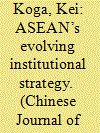

|
|
|
|
|
| Summary/Abstract |
This article argues that a change in institutional strategy enables The Association of Southeast Asian Nations (ASEAN) to manage its great power relations and prevent their abrupt political intrusion into the region by providing the policy options of pursuing institutional balancing, bandwagoning, hedging, or co-option. ASEAN’s strategy is not only to choose optimal policy under a changing security environment, but also to create an institutional division of labour by proliferating ASEAN-led institutions to ensure, as far as possible, regional autonomy and Member States’ security. Changes in ASEAN’s institutional strategy occur when its Member States expect a change in the regional distribution of power. However, due to constraints created by the existing institutional design it is difficult to make any drastic alteration to the institutional strategy unless a radical change in the regional power configuration occurs. This article examines the cases of East Asia Summit and ASEAN Defence Ministers Meeting (ADMM)/ADMM-Plus during the period 2005–2016, the comparison of which illuminates the causes and processes of their strategy change and helps to deepen our understanding of the roles of regional security institutions.
|
|
|
|
|
|
|
|
|
|
|
|
|
|
|
|
| 2 |
ID:
153272


|
|
|
|
|
| Summary/Abstract |
Many international legal experts believe that the Philippines v. China arbitration award of 12 July 2016 represents a game changer for South China Sea dispute settlements because the award has brought a breathtaking legal clarity to the complex disputes. This article argues that the sweeping nature of the award had a very paradoxical effect on Chinese policy. The arbitration ruling has led to the hardening of China’s claims, but it has also raised a new readiness among Chinese policymakers to renew negotiations. The sweepingness of the award makes it hard for the Philippines to reach a negotiated compromise with China on the basis of the award, but it also presents a surprising political opportunity in regional politics for the major actors involved to lower tensions and recalibrate policies. Although China’s new readiness to negotiate is welcome, the overall impact of the three-and-a-half-year-long arbitration is likely to create a deadlock in negotiations in the near future. Paradoxically, this may raise the importance of political and power-centred approaches to regional dispute settlements, as the legal approach embodied by arbitration continues to meet Chinese defiance.
|
|
|
|
|
|
|
|
|
|
|
|
|
|
|
|
| 3 |
ID:
137904
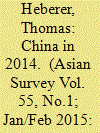

|
|
|
|
|
| Summary/Abstract |
In 2014 China’s development was characterized by a search for structural reforms in both domestic and foreign policies. Domestically, focal issues included the fight against corruption, the implementation of reforms of China’s development model, and a tightening of internal (anti-terror) measures. In foreign policy, traditional paradigms are now under scrutiny, and the regional rivalry with the U.S. has intensified.
|
|
|
|
|
|
|
|
|
|
|
|
|
|
|
|
| 4 |
ID:
116570
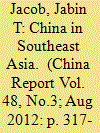

|
|
|
|
|
| Publication |
2012.
|
| Summary/Abstract |
Despite China's claims of a foreign policy of 'peaceful rise'/'peaceful development' and of seeking a 'harmonious world', and despite its economic openness and active participation in economic multilateralism, China's neighbours continue to be concerned about the overall direction and intent of Beijing's security policies. These concerns are particularly heightened by China's rapid military modernization of the past couple of decades. The announcement in 2010 that China considered its territorial claims in the South China Sea a 'core interest', can be seen as a setback to its regional diplomacy, so diligently crafted over the years and drove its Southeast Asian neighbours to seek closer engagement with the US. This article argues that the contradictions evident in China's neighbourhood foreign policy reflect its continuing search for a model of international relations that can balance its domestic interests such as the need for political stability, including regime stability, on the one hand and its external ambitions for a decisive role in regional affairs, on the other.
|
|
|
|
|
|
|
|
|
|
|
|
|
|
|
|
| 5 |
ID:
154662


|
|
|
|
|
| Summary/Abstract |
While existing studies show that China has been a norm-taker in accommodating to the norms of the Association of South East Asian Nations (ASEAN) to manage the South China Sea disputes, the possibility of China as a normative power in shaping ASEAN norms in the context of China–-ASEAN relations has received less attention. This article shall argue that China has sought to socialise ASEAN to recognise China as a normative power by accepting China’s preference for direct bilateral negotiations to handle the disputes while maintaining status quo and non-binding multilateral cooperation. To achieve this objective, throughout the 1990s and early 2000s, China initially adopted ASEAN norms of consensus-based, minimalist multilateralism to earn respectful reciprocation from ASEAN towards China. Subsequently, China sought to socialise ASEAN to recognise a new norm which posits that China, as a benign and responsible power, has the hierarchical primacy and legitimacy to set the pace and direction for handling the South China Sea disputes. Nevertheless, China’s attempts have been met with limited success. By insisting on direct bilateral negotiations which eschew a legally binding and multilateral solution to the territorial spat, China’s actions have challenged ASEAN norms of multilateralism and ASEAN centrality. As a result, ASEAN has reasserted its centrality and consensus-based multilateral diplomacy to steer the management of the disputes. Additionally, China’s increased maritime activities in the South China Sea and conflicting foreign policy messages have further undermined China’s credibility as a normative power to socialise ASEAN.
|
|
|
|
|
|
|
|
|
|
|
|
|
|
|
|
| 6 |
ID:
162450
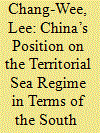

|
|
|
|
|
| Summary/Abstract |
China has a long coastline of approximately 18,000 kilometers and hence an
extensive continental shelf as well as an EEZ. Its coastline is said to be the tenth
longest coastline in the world. The total sea area in the China Seas is about 4.7
million square kilometers. Despite these advantageous circumstances in geography,
China failed to become a maritime power like Spain, Portugal, the Netherlands and
the UK. So it remained a land power for a long time except when Zheng He, the
great seafarer in Chinese history, led the greatest ocean-going fleets of the world of
that time, sailing to the Pacific and Indian Oceans during the years of 1405–1433.
As a result, China suffered foreign invasions several times from the sea, being
defeated in the Opium War as well as at the Sino–Japanese War in the nineteenth
century
|
|
|
|
|
|
|
|
|
|
|
|
|
|
|
|
| 7 |
ID:
152283
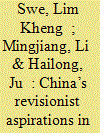

|
|
|
|
|
| Summary/Abstract |
China has significant revisionist objectives in Southeast Asia, including revamping the existing regional security architecture and strategic realignment, reforming the current regional political and security institutions, revising the rules and norms that help regulate regional relations, and aspiring to play a bigger role in regional agenda-setting. Beijing has achieved some success in changing the regional status quo through its good-neighbourliness policy over the past 20 years. But the intricate South China Sea issue is likely to prevent China from fulfilling its revisionist aspirations in the region in the decades to come.
|
|
|
|
|
|
|
|
|
|
|
|
|
|
|
|
| 8 |
ID:
112997


|
|
|
| 9 |
ID:
170657


|
|
|
|
|
| Summary/Abstract |
The South China Sea disputes involve both island and maritime claims among several sovereign states within the region, namely China, Malaysia, the Philippines, Brunei, Vietnam and Taiwan. Framing an analysis of international news and diplomatic relations allows researchers to examine how news organisations provide their audiences with context regarding news stories through content promotion and exclusion. This study examined how the Malaysian and Chinese newspapers reported about the South China Sea disputes and Malaysia–China bilateral relations. The findings indicated that the newspapers reported the topics with different intensity and prominence, while different news sources were employed. It was also found that conflict was a salient frame used by the various newspapers. In addition, this study found that the Malaysian and Chinese newspapers exhibited different valence in reporting the South China Sea disputes. Among the Malaysian newspapers under examination in this study, Sin Chew Daily (a Chinese-language daily) employed the most similar frame to that of the Chinese newspapers, where the coverage was pervasive with supportive valence towards China.
|
|
|
|
|
|
|
|
|
|
|
|
|
|
|
|
| 10 |
ID:
154266


|
|
|
| 11 |
ID:
190657


|
|
|
|
|
| Summary/Abstract |
For the Association of Southeast Asian Nations (ASEAN), the South China Sea (SCS) disputes between China and Southeast Asian claimant states (Vietnam, the Philippines, Malaysia, and Brunei) are a major concern. However, the dominant sceptics are pessimistic about ASEAN’s effectiveness in managing these disputes. This article contributes to the field by providing a systematic analysis on this topic, which is missing within the literature. Also, many of the arguments presented in this article challenge the dominant views and thus provide an alternative understanding of ASEAN’s effectiveness in managing the disputes. The arguments are as follows: First, ASEAN members do have shared interests and a common policy regarding managing the disputes. Second, China’s influence on individual ASEAN members is not as strong as the sceptics often argue. Third, the degree of ASEAN’s goal attainment is medium because it achieved essential goals while conceding important but non-essential ones. Fourth, compared with a legalistic and adversarial posturing approach, ASEAN’s approach is more effective in managing these disputes.
|
|
|
|
|
|
|
|
|
|
|
|
|
|
|
|
| 12 |
ID:
154096


|
|
|
|
|
| Summary/Abstract |
On July 12, 2016, an international arbitration panel based in The Hague ruled in favor of the Philippines against China over South China Sea territorial disputes. This much-anticipated verdict came in the midst of China's increasingly assertive rhetoric and ambitious island-building program in the region. While the ruling steered clear of addressing the merits of sovereignty claims between China and the Philippines, it effectively nullified China's controversial nine-dash line, which is Beijing's unofficial demarcation of its claims over a significant percentage of waters in the South China Sea.
|
|
|
|
|
|
|
|
|
|
|
|
|
|
|
|
| 13 |
ID:
163788
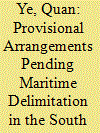

|
|
|
|
|
| Summary/Abstract |
As an extremely delicate and sensitive matter, it is unrealistic to expect the eventual
resolution of maritime delimitation disputes in the South China Sea (SCS) in the
immediate future. To manage the disputes and utilize the disputed maritime area,
the claimants in this region have made continued efforts to conclude provisional
arrangements. Due to the lack of consensus on the precise disputed zones and the
low political will to make concessions, the existing arrangements have several
drawbacks. To break the stalemate, a set of approaches are indispensable. A
reasonable first step might be to develop provisional arrangements in less disputed
maritime areas, especially those areas involving only two states. For areas with
multiple claims or where the claimants have low political will to cooperate, it is
advisable to start with developing arrangements on issues with common interests
and easy to implement. For higher sensitive issues, track two connections might be
employed at first, so as to pave the way for future official cooperation.
|
|
|
|
|
|
|
|
|
|
|
|
|
|
|
|
| 14 |
ID:
185840


|
|
|
| 15 |
ID:
173953
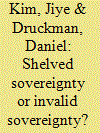

|
|
|
|
|
| Summary/Abstract |
This article contributes to the current discourses on China’s diplomacy in the South China Sea disputes by asking: What does China want to achieve in the various negotiations? By comparing different versions of the multilateral Code of Conduct negotiations between 1992 and 2016, the authors find that the sovereignty issue has been shelved throughout the negotiations. We identify three factors that may account for this finding: the inconsistency of China’s official claims over time, China’s increased bargaining power, and the importance of the shelved sovereignty axiom since the era of Deng Xiaoping. The authors conclude that the normative game continues in the shadows of international norms represented by invalid sovereignty over the contested waters.
|
|
|
|
|
|
|
|
|
|
|
|
|
|
|
|
| 16 |
ID:
120989


|
|
|
|
|
| Publication |
2013.
|
| Summary/Abstract |
The history of the conflicting maritime claims in the South China Sea, focussing particularly on the recent disputes between China and Vietnam/the Philippines.
The author describes how external actors, principally the US, but also India and Japan, have been drawn in as a counterweight to China. He then goes on to assess the possible impact of this political dispute on the essentially economic relationship between China and ASEAN.
His conclusion is that the economic relationship is likely to prove enduring.
|
|
|
|
|
|
|
|
|
|
|
|
|
|
|
|
| 17 |
ID:
158254


|
|
|
|
|
| Summary/Abstract |
One could argue that the modern day China’s key narrative in expanding its territorial claims may have been in response to its historical experience of the ‘century of humiliation’. It refers to the period in which the government of China lost control over large shares of its territory at the hands of the imperialism when foreigner’s i.e. Western powers and Japan (Kaufman, 2011:1).
|
|
|
|
|
|
|
|
|
|
|
|
|
|
|
|
| 18 |
ID:
133779
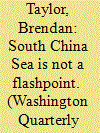

|
|
|
|
|
| Publication |
2014.
|
| Summary/Abstract |
Two important anniversaries arrive in 2014 for protracted South China Sea disputes. January 19 marked 40 years since Chinese and Vietnamese forces clashed over the Paracel Islands, resulting in the deaths of more than 50 Vietnamese personnel and an undisclosed number on the Chinese side-at least the second-largest loss of life to have occurred in any single incident involving these disputed waters. Late 2014 will also mark 20 years since China controversially built structures on the aptly named Mischief Reef in the Spratly Islands, prompting a further series of incidents at sea. Recent reports that China has moved large concrete blocks to Scarborough Shoal-yet another disputed reef that was the scene of an April 2012 standoff between Chinese and Philippines vessels-have sparked concerns in Manila that history is repeating.
|
|
|
|
|
|
|
|
|
|
|
|
|
|
|
|
| 19 |
ID:
131265


|
|
|
|
|
|
|
|